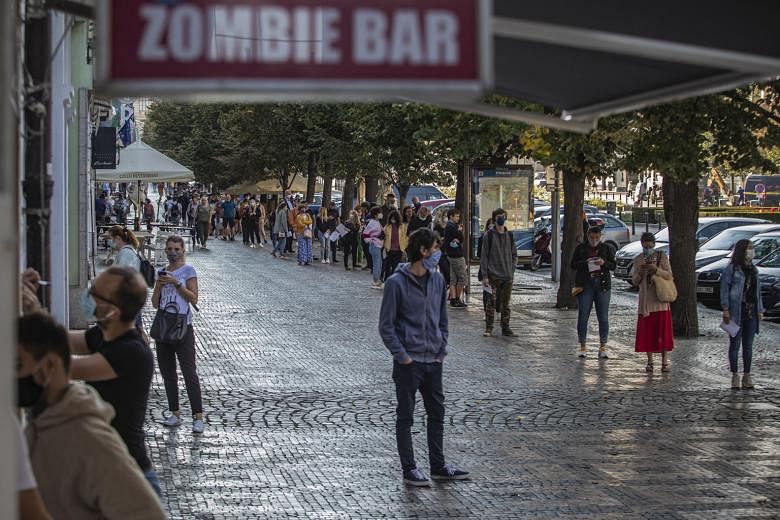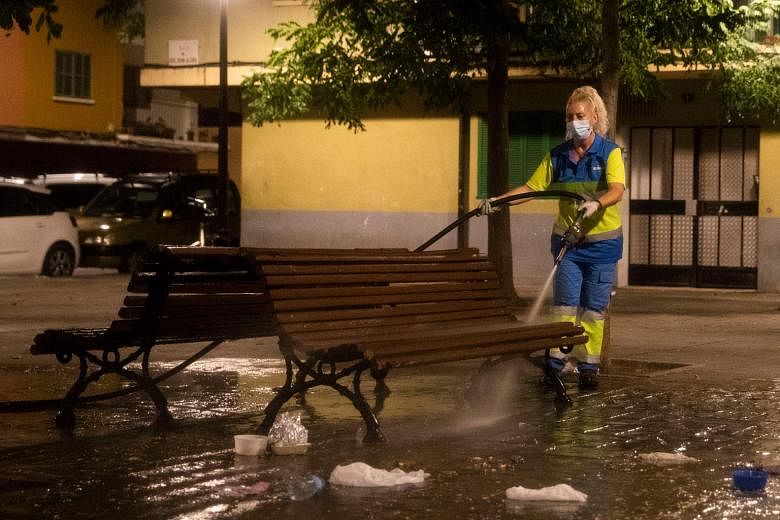COPENHAGEN • Large parts of Europe yesterday geared up for broad new restrictions to stop the coronavirus after infections worldwide topped 30 million.
Britain is limiting gatherings and France is set to roll out new curbs for major cities as governments across the continent battle fresh spikes in the disease.
The Spanish capital of Madrid said it has been overwhelmed by the virus and called for decisive action from the central government, which is set to unveil a raft of new restrictions.
Madrid officials warned that the region's healthcare system is coming under increasing pressure, with one in five hospital beds occupied by Covid-19 patients amid a second wave of the illness.
Anxiety has been growing in the city about the prospect of a return to lockdown after a top regional health official raised the possibility for the worst-hit areas.
"It would be bad for shops, for small businesses and little bars that survive on people coming in," said Ms Maribel Quesada, 55. "People are really sick of being at home; the lockdown was very difficult."
In Britain, new curbs took effect yesterday, with Prime Minister Boris Johnson warning that pubs may have to close earlier to avoid a "second hump" of infections.
About two million people in north-east England, including in the cities of Newcastle and Sunderland, will no longer be allowed to meet people outside their homes. Only table service will be allowed in bars, and entertainment venues will have to close by 10pm.
The government already imposed rules across England on Monday limiting socialising to groups of six or fewer, as daily cases reached levels not seen since early May.
British ministers yesterday declined to rule out the possibility of imposing a short national lockdown to tackle the surge in cases.
The French authorities are also preparing tighter restrictions in several cities to curtail a resurgence that has seen nearly 10,000 new cases per day in the past week.
Health Minister Olivier Veran said Lyon and Nice would be under new rules by today, after curbs on gatherings were imposed this week in Bordeaux and Marseille.
France registered a record 10,593 new cases in 24 hours, Health Ministry data showed on Thursday, the country's highest single-day count.
The rise followed a government decision to make Covid-19 tests free, leading to a surge in testing and an increase in infection rates.
The ministry reported that the cumulative number of cases had risen to over 415,000 and the death toll had risen by 50 to 31,095, the second-highest number of new deaths in a day in two months.
About 1.2 million tests were carried out last week, the health minister said. Data shows 5.4 per cent of tests were positive.
The Czech Republic registered a record high of 3,130 new Covid-19 cases on Thursday, reaching in 24 hours a figure comparable with that for the entire month of March, its Health Ministry data showed yesterday.
It was the third straight daily record for the European Union member of 10.7 million people, which has registered more than 44,000 cases and 489 deaths since the March outbreak.
Israel became the first developed country to enforce a second nationwide shutdown yesterday.
The move sparked protests in Tel Aviv late on Thursday when hundreds took to the streets against the restrictions, which took effect just hours before the Jewish New Year and cover other religious holidays, including Yom Kippur.
The country has the world's second-highest virus infection rate after Bahrain. Under its new measures, residents will be limited to within 500m of their homes.
As anger grows over how the authorities worldwide have responded to the virus, some governments are facing legal action from citizens over alleged failures.
A French association of Covid-19 victims plans to file a legal complaint against Prime Minister Jean Castex, its lawyer said.
Suits have also been filed in China by bereaved relatives but many have had them abruptly rejected, while dozens of others face pressure from the authorities not to file, according to people involved.
Families of victims accuse the governments in Wuhan city and Hubei province, ground zero of the pandemic, of concealing the outbreak when it first emerged, failing to alert the public and bungling the response.
"They say the epidemic was a natural calamity. But these serious outcomes are man-made, and you need to find who is to blame," said pensioner Zhong Hanneng, whose son died of the virus.
"Our family is shattered," she added. "I can never be happy again."
AGENCE FRANCE-PRESSE, REUTERS












